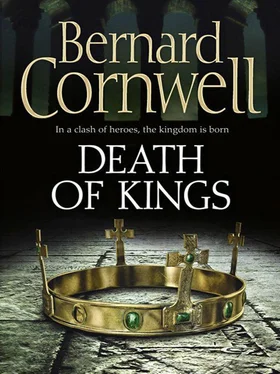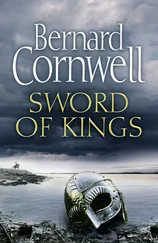‘Probably, lord.’
‘Because you’ve seen the Danes,’ I said. ‘So tell King Edward I need men. Tell him,’ I paused, trying to make a decision that would not be destroyed by the passage of time. ‘Tell him they should meet me at Wygraceaster. And if Wygraceaster is under siege, tell them to look for me at Cirrenceastre.’ I already knew we would have to retreat and by the time Edward responded and sent men, if he sent any at all, I could well have been pushed south of the Temes.
The three men rode on south and we probed cautiously north, our scouts ahead and to the flanks. And I saw that the darkness in the morning sky was not a thundercloud, it was the smoke of burning thatch.
How often I have seen the war-smoke smearing the sky, dark and roiling, rising from beyond trees or from some valley, and knowing that another steading or village or hall was being reduced to ashes. We rode slowly north and I saw for myself that Plegmund’s peace was ended and I thought how it had been the peace that passeth understanding. That is a phrase from the Christian’s holy book, and certainly Plegmund’s peace passed all understanding. The Danes had been quiet for so long and that had led Plegmund to believe his god had gelded his enemies, but now they had broken the incomprehensible peace, and the villages and farms and ricks and mills were burning.
It was an hour before we saw the Danes. Scouts rode back to tell us where the enemy was, though the smoke in the sky was indication enough and already the road was crowded by folk trying to escape the invaders. We rode to the crest of a low wooded hill and watched the steadings burn. Immediately beneath us was a hall with barns and storehouses. It swarmed with men. A wagon stood by the hall, and I watched the newly gathered harvest being piled onto the wagon’s bed. ‘How many?’ I asked Finan.
‘There’s three hundred men there,’ he said, ‘at least three hundred.’
And more men were in the wide vale beyond. Bands of Danes crossed the meadows, looking for fugitives or more places to ravage. I could see a small huddle of women and children who had been spared and who were being guarded by sword-Danes and doubtless they were on their way to the slave market across the sea. A second wagon, piled with cooking pots, spits, a loom, rakes, hoes and anything else that could be useful, was whipped northwards. The captured women and children, along with a great herd of livestock, followed, and a man tossed a burning brand up onto the hall’s thatch. A horn sounded from somewhere in the valley and gradually the Danes obeyed its insistent call and the horsemen moved towards the road. ‘Jesus,’ Finan said, ‘but there are hundreds of the bastards.’
‘See the skull,’ I said. I could see a human skull held aloft on a pole.
‘Haesten,’ Finan said.
I looked for Haesten himself, but there were too many horsemen. I did not see any other banners, at least none that I recognised. For a few moments I was tempted to take my men to the east and gallop down the hill to cut off a few of the enemy stragglers, but I resisted the temptation. Those stragglers were not far from the larger bands, and we would be pursued immediately and overwhelmed by numbers. The Danes were not moving fast, their horses were rested and well-fed, and my task now was to stay ahead of them to watch what they did and where they went.
We went back down the road. All day we retreated, and all day the Danes came on behind us. I watched the widow’s hall burn, saw the smoke rise to east and west, and the great plumes in the sky suggested there were three war-bands harrying the country. The Danes were not even bothering to use scouts, they knew their numbers were sufficient to crush any enemy, while my scouts were forever being pushed back. In truth I was blind. I had no real idea how many Danes we faced, I just knew there were hundreds of them and that the smoke was rising and I was angry, so angry that most of my men avoided my gaze. Finan did not care. ‘We need a prisoner,’ he said, but the Danes were being careful. They stayed in large troops, always too many for my few men. ‘They’re in no hurry,’ Finan observed in a puzzled tone, ‘and that’s strange. No hurry at all.’
We were on another low hill, still watching. We had left the road because the Danes were following it and too many folk were using it to escape southwards, and those folk wanted to stay close to us, but their presence only made us more vulnerable. I told those fugitives to keep going south and we watched the Danes from the hills east of the road and as the day wore on I became ever more baffled. As Finan had said, the Danes were in no hurry. They were scavenging like rats in a bare granary, exploring every hovel, hall and farm, taking anything useful, yet this was country that had been harried before, part of the dangerous land between Saxon and Danish Mercia, and the pickings had to be slight. The real plunder lay southwards, so why were they not hurrying? The smoke was warning the countryside of their coming and folk had time to bury their valuables or else carry them away. It made small sense. The Danes were picking up scraps while the feast lay unguarded, so what were they doing?
They knew we were watching them. It is impossible to hide a hundred and forty-three men in half-wooded country and they must have glimpsed us in the distance, though they could not have known who we were because I deliberately did not fly my banner. If they had known Uhtred of Bebbanburg was so close and so outnumbered they might have made a greater effort, but it was not until late in the afternoon that they tried to lure us into battle and even then it was a half-hearted effort. Seven Danish horsemen headed south on the now empty road. They were ambling, but I could see them glancing nervously towards the woods that hid us. Sihtric grinned. ‘They’re lost.’
‘They’re not lost,’ Finan said wryly.
‘Bait,’ I said. It was too obvious. They wanted us to attack and as soon as we did they would turn and gallop north to lead us into an ambush.
‘Ignore them,’ I ordered, and we went south again, crossing the watershed so that ahead of us in the deceptively peaceful evening shadows I could see a glint of the Sæfern. I was hurrying a little, wanting to find a place where we could spend the night in relative safety and far from the Danes. Then I saw another glint, a glimmer, a mere flash amidst the long shadows, and it was away to our left and I stared a long time and wondered if I had imagined it, then saw the prick of light again. ‘Bastards,’ I said, because I knew why the Danes had been so sluggish in their pursuit of us. They had sent men looping around our eastern flank, a war party to cut us off, but the low sun had reflected from a helmet or a spear-point, and now I could see them, far far off, mailed men among the trees. ‘Ride!’ I called to my men.
Spurs and fear. A mad gallop down the long slope, hooves thudding, shield banging against my back, Serpent-Breath’s scabbard flapping against the saddle, and off to my left I saw the Danes come from the trees, far too many Danes. They were spurring their horses into a reckless gallop, hoping to cut us off. I could have swerved west away from them, but I reckoned a second Danish party might have gone that way and we could have ridden straight into their swords, so the only hope was to go south, hard and fast, riding to escape the jaws that I sensed were closing on us.
I was riding towards the river. We could not ride faster than our slowest horses, not without sacrificing men, and the Danes were spurring hard, but if I could reach the Sæfern then there was a chance. Drive the horses straight into the water and make them swim, then defend the farther bank if we survived the mad crossing, and so I told Finan to head towards the last place we had seen a sliver of reflected sunlight from water while I rode at the back of my men, where I was pelted by clods of damp earth slung up by the heavy hooves.
Читать дальше
Конец ознакомительного отрывка
Купить книгу












